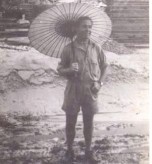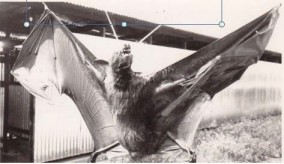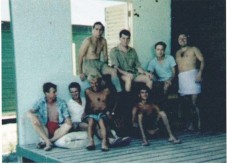Memories of Our Far East Adventure by Harry Trumbell and Brian Morrison
Brian has provided me with comprehensive details of his memories of Borneo and Labuan which I have included in this article. However, before we start I think it will be of interest to set the scene:
Borneo is the second biggest Island in the world. In 1961 the PM of Malaya proposed the formation of a Federation of Malayasia to combine Malaya, the colony of Singapore and the three (British) Borneo territories (Sarawak, Brunei and the colony of North Borneo.
Indonesia (President Sukarno) had a wider strategic dream of the whole of Borneo rightfully belonging to Greater Indonesia and was determined to recover the northern territories. The initial uprising started on 6th December, 1962, but only lasted eight days. It was after this that the Joint Force Commander established his HQ on Labuan Island where the RAF already ran a transit airfield. The second confrontation began on 12 April, 1963. From start to finish troop carrying RAF, RNAS and Army helicopters played a vital and decisive role. At its peak, some 17,000 Commonwealth troops had been deployed in Borneo – 2 Royal Marine Commandos, 15 British battalions, an Australian and a NZ battalion, 8 Gurkha battalions and Malayan infantry. In May, 1966 Dr Suharto (Sukarno’s successor) ended it all.
In September, 1964 Brian and I left RAF Innsworth (Emergency Holding Unit) to RAF Lyneham to board the RAF Britannia flight to Singapore. The flight was long (29 hours) and rather tedious, staging through El Adem, Aden (where we had an 8 hour delay – technical fault!) and Gan.
On arrival at Changi we were taken to the NAAFI where we were given a white card which gave the name of the base to which we were to be detached. Both of us were to be detached to Kuching. We were then taken to the transit block. Nothing happened for about a week – Emergency! What Emergency? We had no duties so most of the time was spent lounging around Changi’s excellent swimming pool. When we got our movement instructions they informed us we would be travelling to Kuching on the Tank Landing Ship ‘Maxwell Brander’. Unlike Brian I spent most of the time on board in the shade. Brian made a typical ‘moonie’ error and got badly sunburned! The food on board was awful. I remember living on oranges and Mars bars. On arrival at Kuching Brian and I went our separate ways until we met up again in Labuan.
The following notes are Brian’s memories (mine follow later):
On arrival at Kuching I was put to work in the Forward Air Tasking and Operations Centre (FATOC) based in a Malaysian Police Barracks in the town centre about 5 miles from the base. This was probably the ‘cushiest’ job I ever had. My duties consisted of typing and sending out the morning signal to Singapore and then spending the rest of the day sitting by a radio set making four-hourly routine calls to the Singapore Ops Centre. To do this I had an air traffic controller to assist me! So, as you can imagine, we read a lot of books!
After about two weeks I was told that I was to be moved to Labuan. I was quite pleased about that as a good friend from apprentice days, Graham Heath. was serving there on a ‘one year’ tour so I knew that I would be in good company.
My flight up to Labuan was by courtesy of the Malaysian Air Force in a Handley Page Herald – quite a pleasant experience.
It was a bit difficult finding accommodation on arrival, but I soon made contact with Graham and he found me a bed in his billet. The accommodation is worthy of mention. We were accommodated in large wooden huts located on the Membdai site about a quarter of a mile from the main camp. I think each hut housed about thirty people but it was reasonably comfortable. The only problem was the lack of furniture. We had a bed and bedding and that was it. No lockers to store your kit. This led to lots of originality and initiative as most of us ‘improvised’ – orange boxes being the favourite source of bedside lockers.
Although the huts were reasonably comfortable the toilets were somewhat lacking, mainly because the ‘stall’ had no doors so ‘having a dump’ could become a social event! That took a bit of getting used to! The Membdai site consisted of nothing but accommodation, everything else including work areas, the messes, the Naafi and the cinema were a half mile walk up the hill.
Financially we were quite well off as we were paid the equivalent of £2 -10s LOA and you could live reasonably well on that amount when a pint of Tiger Beer was one dollar or 2s and tickets for the nightly cinema were about the same price. The only other diversion was the Women’s Voluntary Service canteen run by the only ‘white’ female for many miles around. She seemed to be quite old to us youngsters but, as the weeks passed by, she appeared to get more attractive! The NAAFI was pretty basic but served its purpose. It did lack one important facility – toilets. They were located some distance away. Some people could not face yet another trip to the ‘bogs’ after several pints of Tiger so they relieved themselves off the balcony. The RAF police got wind of this and often lay in wait to catch the miscreants. Indiscriminate Urination was a common charge published in PORs!
Another common ‘offence’ was leaving a weapon unattended. It was policy for 25% of the strength to be armed at all times so everyone took turns in keeping a rifle with him. Sadly some people forgot they had one and walked away leaving it behind. This was considered to be a most serious offence and the standard punishment was 7 days detention which meant a trip, under escort, to Changi to serve one’s sentence. The strange thing about this was that, on release, the prisoner was considered to be a ‘priority passenger’ and was flown back on the first available flight, whereas the escort had no priority and quite often the prisoner arrived back at Labuan before his escort!
There were a number of ex-admin apprentices serving on Labuan in 1964 namely Mal Deas (39th), Graham Heath (44th), Me(44th), Roger Daniels(44th Supplier), Ian Hunter (45th), John Dyer(46th) and, of course Harry.
Life in the hut was quite a social affair with a good sense of camaraderie. We played a lot of board games in the evenings. Wild monopoly and scrabble nights were the norm – such fun. Occasionally someone would think up an original way to pass the time and invent a new ‘game’. One popular pastime was ‘Dodge the Flip-Flop’. This involved very simple rules. Someone would throw a flip-flop into the rotating ceiling blades when set to full speed in the hope that it would fly out and hit someone. That was fine until some bright spark came up with the idea of replacing the flip-flop with an empty beer can. They tended to hurt a bit if they hit you. I have a memory of John Dyer lying in his bed reading and wearing his tin helmet as a precaution.
On one occasion a group of guys adopted a small monkey which kept them amused for hours. They were forever teasing him and most of the time he seemed to enjoy it. However, one night he took exception to his treatment and made a great leap into the air and grasp the lamp hanging from the ceiling. It was extremely hot! He gave out a loud screech and leapt for the next lamp. Of course that was equally hot! At the third lamp he finally got the message and fell to the floor – he was not impressed!
One of the perks of life in Labuan was that there was no shortage of local labour. The indigenous population was only too pleased to find work on the camp and filled all sorts of roles. This was very much to our benefit as had a ‘Dhobi’ boy or servant who carried out the more mundane tasks such as cleaning shoes, bed making and laundry. My Dhobi was named ‘Pop’, a good natured man of quite mature years who looked after about 20 clients. His services cost me just 3/6 per week – quite a bargain.
The wild life on the island was, to say the least, interesting but, for me, the most memorable thing was underwater. Membdai beach was only a short walk from the domestic site and I spent many happy hours snorkelling among the coral reefs that surrounded that part of the island. It was a wonderland full of the most fascinating and exotic creatures imaginable. The hours just flew by. We had been informed that unlike mainland Borneo none of species was considered dangerous. I am not sure about that. One day a group was walking down the rocky path to the domestic site when they encountered a large snake coiled in the path and staring at them in a rather malevolent manner. For a short period of time both the snake and the group were frozen before all of a sudden all disappearing in different directions.
My worst experience with the wild life was when, one night, a mosquito had found its way into my mosquito net. The following morning I awoke to find that I was covered in bites. With the help of a friend I counted them. There were 112! After a few days most of them cleared up except for one on my knee which became sceptic and required treatment at the medical centre. I wonder if I can claim to have been injured on active service?
During my time on Labuan I even managed to find time to do a bit of work. I was the clerk in charge of the receipt and despatch of all classified mail. Not a particularly demanding job but it helped to fill in the days. As I was working in the Central Registry I did not have much contact with the operational side of the base but I was aware that a lot seemed to be going on. I think we were operating Shackletons, Beverly’s and Belvedere Helicopters (there was probably a unit of fighters but I can’t remember them). In addition there was a RNZAF Canberra squadron. They were a pretty good bunch. In addition to air force personnel there was a polyglot mixture of other service units which made life colourful and interesting.
Harry’s memories:
The accommodation at Kuching was really good. I was billeted in a Longhouse bungalow – no windows, but surrounded by a large veranda. The bungalow was kept clean and our laundry done by a local ‘Dhobi’ lady. She even shined our shoes! My work base was SHQ doing odd tasks/duties as required (very little really). This gave me a lot of spare time. Being a very keen sportsman I had taken my rugby kit with me!! So I was very pleased to link up with Norman Bruce (A Captain in the Royal Ordnance Corps). He played rugby for the Army, Combined Services and Scotland. Together we organised a 7-aside rugby tournament for local and service teams- a welcome break from the mundane. Another pleasure was the opportunity of occasionally going into Kuching town for a decent meal etc.
The two photos show me with my bamboo umbrella standing in the usual daily downpour outside my bungalow and a dead flying fox (fruit bat) hanging on the washing line. It had broken its neck flying into the ablution block. They are the largest species of bat often weighing up to 1 kg with a wing span of about 1.5m.

It was three weeks or so before I was transferred to Labuan. I travelled there on a Malaysian Air Force twin engine Belvedere Helicopter which was quite an exciting experience – we dropped a few army lads off in Brunei on the way. My first week was spent living in a large tent before finding a spare bed in Brian’s billet. The photograph on the veranda includes me sitting on the left side of the window sill next to Graham Heath. Brian is standing on the right wearing just a towel!!
For the next two months I worked for Sqn Ldr John Tyson in HQCOMAIRBOR. He was also the Oi/c Sub Aqua Activities on Labuan. We got on well and he introduced me to the wonders of sub aqua diving. I still have his letter detailing the training he provided for me. I have attached a copy of his letter which may be of interest. The training took place off Shell Pier and near to Papan Island in the South China Sea. It was during one of the dives off Papan that we encountered a group of white tip sharks. Fortunately they are not as fearsome as the leopard sharks which are also found in the seas around Labuan.
When I was stationed at RAF Akrotiri (Cyprus) I remember that we had an ‘Anti Mosquito Unit’. In Labuan we had a dedicated team of scorpion catchers with just one Bedford truck – with a large model of a black scorpion fixed on the cab roof. One day when clearing away some washed up crates I found a whole family of ‘Asian Forest Scorpions’. They are black in colour, about 6 inches long, and being naturally aggressive will readily sting when cornered. I did not hang around. Another dangerous creature I encountered on one of my explorations was one of the most common snakes in Borneo – a cobra snake. Happily we parted our different ways fairly quickly. There are around 160 different species of snake found in Borneo, but only 24 are front fanged and highly poisonous.
The main town on the Island is Victoria. When I had the chance I visited the town for a decent meal. On the way I passed the Labuan War Cemetery which was about one mile from the airfield. The cemetery and the 3,900 graves are kept in pristine condition by the local people. I found the visit quite emotional.
It was three months since we left UK when suddenly it was all over and Brian and I were told that we were going home – in time for Christmas!! So, it was off back to Changi. By plane this time – to spend another week by the pool waiting for our flight home. I cannot remember if we were on the same flight, but for both of us the flight was by civil airline (British Caledonian Britannia – which I remember also flew into Labuan once a week). Brian remembers that it was a much more comfortable experience and took half the time of our flight out to Singapore. Amazingly, thirty six years later, Brian and I met up at the 2001 reunion! PS. Labuan today is a thriving tourist destination – and they still drive on the left-hand side of the road! If you are interested please check out the internet (utube) for more up to date information etc.
« Alan Bell (29th Entry) || Memories Of My First Overseas Posting »